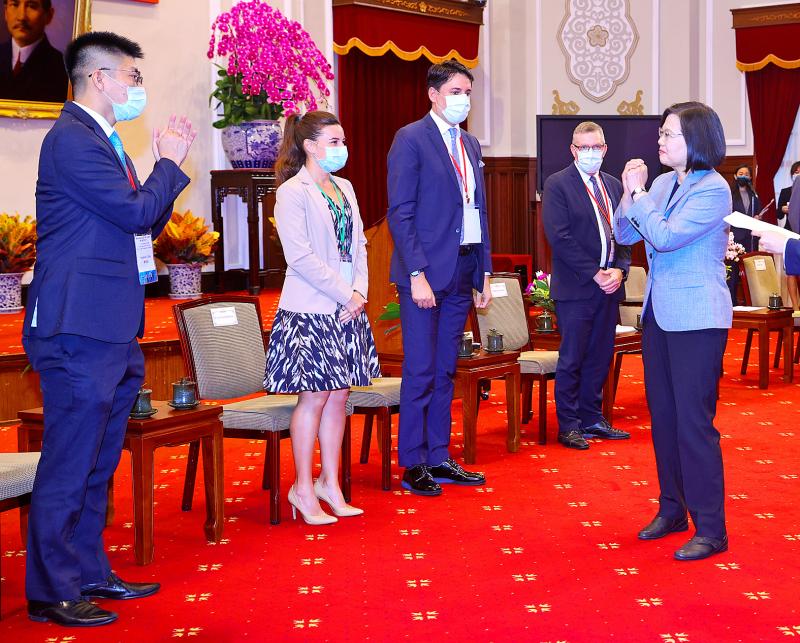President Tsai Ing-wen (蔡英文) yesterday handed out the 998th, 999th and 1,000th employment gold cards to foreign professionals in a ceremony at the Presidential Office in Taipei.
One thousand cards have been issued since the government launched the Employment Gold Card system to attract foreign professionals with outstanding achievements or unique abilities to work, invest and live in Taiwan, Tsai said.
The 998th card was given to Seamon Chan (陳希孟) from the US, who helps Taiwanese start-ups go global through investment in Taiwan, she said.

Photo: CNA
The 999th cardholder is Mustafa Ozgur Baydarol from Turkey, who holds 10 patents and is an inventor in the high-technology sector, Tsai said.
The 1,000th card was presented to American Rodney Dean Morgan, she said, adding that she hoped he would continue to take part in the development of the semiconductor industry in Taiwan.
YouTube cofounder Steve Chen (陳士駿) and many other cardholders from Silicon Valley and around the world also attended the ceremony, Tsai said.
“You are welcome to Taiwan, to work together with us,” she said.
The large number of outstanding professionals in Taiwan exemplifies the numerous opportunities available in the nation amid the restructuring of global supply chains, she said.
Noting that Taiwan’s democracy and freedom, its rich and diverse culture, and safe environment are suitable for investment, Tsai said she believed that with the assistance of international professionals, the nation’s businesses would become more global, and develop a broader vision and strong international competitiveness.
The Taiwan Employment Gold Card system is part of the Act for the Recruitment and Employment of Foreign Professionals (外國專業人才延攬及僱用法), which was implemented in February 2018, to attract highly skilled foreign talent.
The act relaxes regulations on visas, work permits, taxes, insurance, pensions and residency for foreign professionals and their families.
The employment gold card is simultaneously a work permit, residence visa, Alien Resident Certificate and re-entry permit.

INVESTIGATION: The case is the latest instance of a DPP figure being implicated in an espionage network accused of allegedly leaking information to Chinese intelligence Democratic Progressive Party (DPP) member Ho Jen-chieh (何仁傑) was detained and held incommunicado yesterday on suspicion of spying for China during his tenure as assistant to then-minister of foreign affairs Joseph Wu (吳釗燮). The Taipei District Prosecutors’ Office said Ho was implicated during its investigation into alleged spying activities by former Presidential Office consultant Wu Shang-yu (吳尚雨). Prosecutors said there is reason to believe Ho breached the National Security Act (國家安全法) by leaking classified Ministry of Foreign Affairs information to Chinese intelligence. Following interrogation, prosecutors petitioned the Taipei District Court to detain Ho, citing concerns over potential collusion or tampering of evidence. The

‘FORM OF PROTEST’: The German Institute Taipei said it was ‘shocked’ to see Nazi symbolism used in connection with political aims as it condemned the incident Sung Chien-liang (宋建樑), who led efforts to recall Democratic Progressive Party (DPP) Legislator Lee Kun-cheng (李坤城), was released on bail of NT$80,000 yesterday amid an outcry over a Nazi armband he wore to questioning the night before. Sung arrived at the New Taipei City District Prosecutors’ Office for questioning in a recall petition forgery case on Tuesday night wearing a red armband bearing a swastika, carrying a copy of Adolf Hitler’s Mein Kampf and giving a Nazi salute. Sung left the building at 1:15am without the armband and apparently covering the book with a coat. This is a serious international scandal and Chinese

Seventy percent of middle and elementary schools now conduct English classes entirely in English, the Ministry of Education said, as it encourages schools nationwide to adopt this practice Minister of Education (MOE) Cheng Ying-yao (鄭英耀) is scheduled to present a report on the government’s bilingual education policy to the Legislative Yuan’s Education and Culture Committee today. The report would outline strategies aimed at expanding access to education, reducing regional disparities and improving talent cultivation. Implementation of bilingual education policies has varied across local governments, occasionally drawing public criticism. For example, some schools have required teachers of non-English subjects to pass English proficiency

TRADE: The premier pledged safeguards on ‘Made in Taiwan’ labeling, anti-dumping measures and stricter export controls to strengthen its position in trade talks Products labeled “made in Taiwan” must be genuinely made in Taiwan, Premier Cho Jung-tai (卓榮泰) said yesterday, vowing to enforce strict safeguards against “origin laundering” and initiate anti-dumping investigations to prevent China dumping its products in Taiwan. Cho made the remarks in a discussion session with representatives from industries in Kaohsiung. In response to the US government’s recent announcement of “reciprocal” tariffs on its trading partners, President William Lai (賴清德) and Cho last week began a series of consultations with industry leaders nationwide to gather feedback and address concerns. Taiwanese and US officials held a videoconference on Friday evening to discuss the